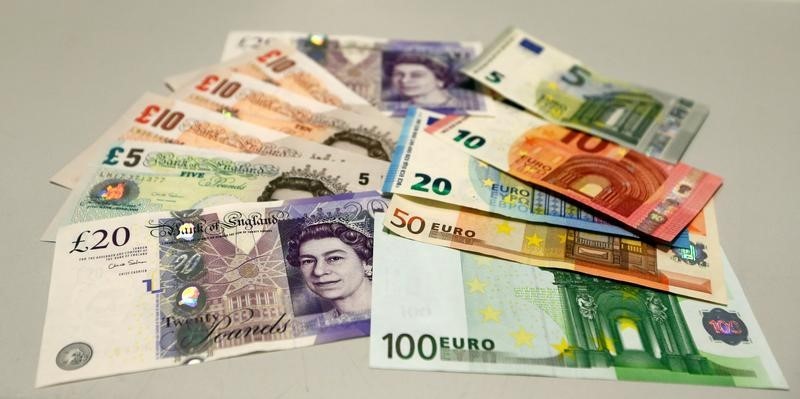By Anirban Nag
LONDON (Reuters) - Sterling stayed under siege on Monday, holding above a 31-year low against the dollar, with sentiment distinctly sour after Britain opted to exit the European Union, triggering shockwaves across global markets.
The euro was also under pressure, pulled down by sterling, as Brexit clouded the future of the European Union. Safe-haven currencies like the yen and the Swiss franc extended gains, much to the discomfiture of the Japanese and Swiss central banks.
Sterling was down 1.8 percent at $1.3460
The pound dropped as much as 11 percent on Friday, its worst day in modern history, as investors betting on Britain remaining in the EU were reversed en masse.
And while the shock and panic appeared to have subsided for now, price swings are likely to be extreme given the lack of clarity on who runs the British government, a likely fresh move for Scottish secession, the response of the EU and its ability to contain calls by anti-EU parties across the continent.
Given all the uncertainty, investors were pricing in a chance of a rate cut with some analysts expecting the Bank of England to consider quantitative easing to cushion the economy.
"The overnight indexed swap market is currently pricing 38 basis points of cuts from the BoE over one-year time horizon," said Petr Krpata, currency strategist at ING, adding investors were also concerned about Britain's large current account deficit, pegged at 7 percent of GDP.
"While we deem sterling as undervalued at these levels, the mixture of political uncertainty, flagging growth and concerns about the current account deficit should keep a lid on sterling during the weeks and months ahead and prevent any meaningful or long lasting recovery."
Many economists have cut growth forecast for the UK. Goldman saw Britain entering a mild recession within a year due to a deterioration in its terms of trade, scaled-back investment and tighter financial conditions because of exchange rate fluctuations, and weakness in risk assets.
SAFETY IN YEN
The safe-haven yen and the Swiss franc (EURCHF=) rose broadly. The Swiss National Bank had intervened on Friday while investors are likely to test the Bank of Japan's resolve in coming weeks.
The greenback was weaker at 102.15 yen
"If the yen was to strengthen further, it likely won't be due to speculative forces alone. The so-called 'real money' Japanese investors could repatriate funds and add to yen strength," said Koji Fukaya, president of FPG Securities in Tokyo.
Japanese Prime Minister Shinzo Abe said on Monday he has instructed Finance Minister Taro Aso to watch currency markets "ever more closely" and take steps if necessary, four days after Britain's historic vote.

The euro